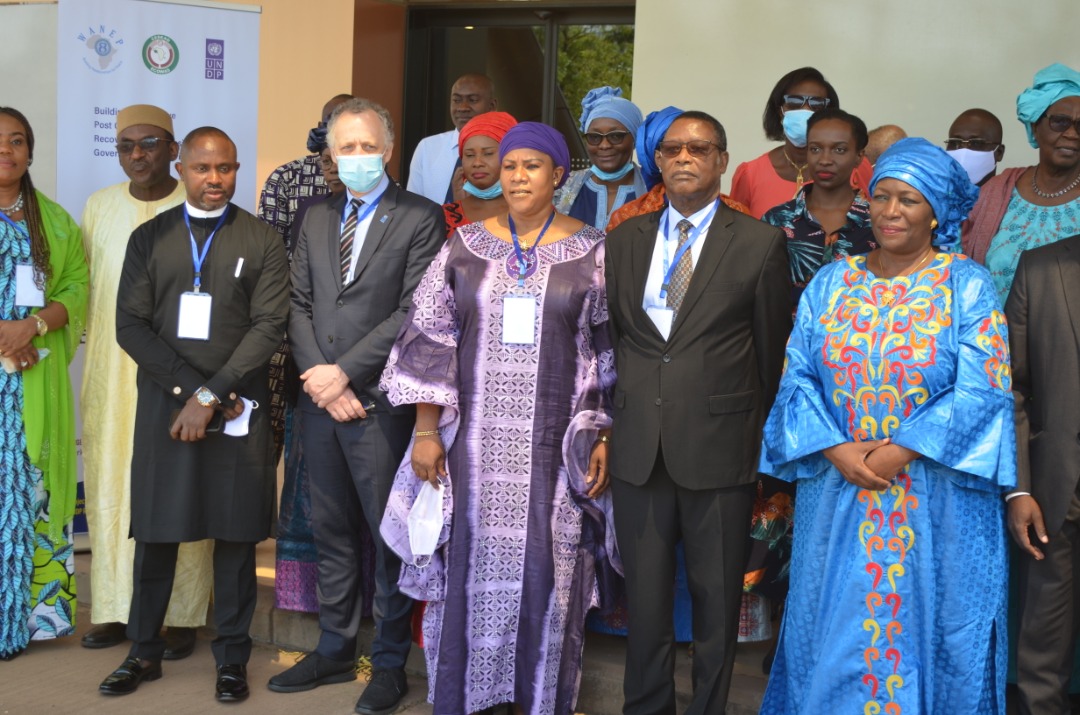Participants at the project launch in Bamako, Mali
Bamako, 28 October 2020 – High-level representatives from the West Africa Network for Peacebuilding (WANEP), the Economic Community of West African States (ECOWAS) and UNDP launched a new project titled, ‘Building an Inclusive Post COVID-19 Recovery, Crises Transitions and Governance Reforms in the Sahel’.
Co-created and supported by UNDP, ECOWAS and WANEP, this initiative is expected to complement ongoing efforts towards inclusive democratic governance and peaceful transitions in Mali, Cote d’Ivoire, Niger and Burkina Faso. It seeks to strengthen systems and structures that empower women at local and national levels as critical stakeholders in political transitions, governance, peace, security and development.
In his opening remarks, Dr. Chukwuemeka Eze, the Executive Director of WANEP, stated that the implementation of the project would rely on UNDP, WANEP and ECOWAS unique experiences and lessons learned over the years in supporting peaceful political transitions, inclusive democratic governance through early warning and response, political dialogues, advocacy, policy influencing and capacity building.
In her keynote address, H.E. Bineta Diop, the African Union Special Envoy on Women, Peace and Security, focused on the vulnerabilities faced by women in the current pandemic and why women’s participation in leadership is essential to addressing the health and socio-economic crisis. “We must act swiftly to find solutions to the bottlenecks holding back African women,” she stated, adding that “in the context of COVID-19, actions that encompass the informal sector and SMEs; actions that harness the benefits of digitization for women's enterprises; actions that target women for social protection programmes; and actions that ensure that youth are prioritized - will help give a face to the unique value of women in governance - leading with purpose - and commitment to society”.
Recognizing that women play a crucial role in maintaining peace in the Sahel, Ms. Ahunna Eziakonwa, UNDP Regional Director for Africa, noted that women’s further involvement in conflict prevention and peace initiatives across the region is “a key condition for sustainable peace, stability and development”. Women’s leadership and contributions, she added, “must be at the heart of resilience and recovery efforts as we strive to address the COVID-19 pandemic and its impacts. Women’s leadership and their participation in post COVID-19 recovery, crises transitions and governance reforms are critical to building peaceful, inclusive and resilient societies”.
In her remarks, Dr. Finda Koroma, Vice President of the ECOWAS Commission, underlined that “the equal participation of women in all aspects of peace and security is fundamental to inclusive democratization, good governance and sustainable development in the region. This project will contribute to the ECOWAS vision of a world of equal access opportunities for both women and men”.
Ms. Giovanie Biha, Deputy Special Representative of the Secretary General at the United Nations Office for West Africa (UNOWAS), expressed full support for empowering women at the local and national levels, adding that “the launch of this joint initiative is a strategic step in the right direction as it aims to enhance women’s participation in governance, political and decision making processes. Women must be fully equipped and able to bring contribute expertise as voters, candidates, civil society leaders, religious figures and community organizers”.
This year marks the 20th anniversary of UNSC Resolution 1325 on women, peace and security as well as the 25th anniversary of the Beijing Declaration and Platform for Action. Despite these landmark agreements, the number of African women in political leadership remains a work in progress. Women make up 22.2% of African parliamentarians and 23% of African ministers. There are only 13 women ministers of health, four women ministers of finance and one female president in office.
The recent political crisis in Mali and the tensions surrounding electoral processes in the Sahel reveal the complex and multi-layered challenges that threaten peace, stability and development across the region. Therefore, the initiative seeks to ensure a gender inclusive response to the ongoing political and security crises, as well as accelerate the implementation of the women, peace and security agenda in the Sahel as envisaged in UNSC 1325 and in line with the broader regional and continental peace and development agenda.
The initiative will support the creation of women’s platforms to contribute to inclusive political transitions and dialogue processes in the four countries; the participation of women in the Mali political dialogue, transition and reforms; gender inclusive governance; women-led community responses to COVID-19; leadership capacity development; and inter-generational dialogues.
For more information, contact:
Dr. Chukwuemeka Eze, Executive Director, WANEP
wanep@wanep.org
Michelle Mendi Muita, Regional Programme Communications Specialist, UNDP michellemendi.muita@undp.org

 Locations
Locations



